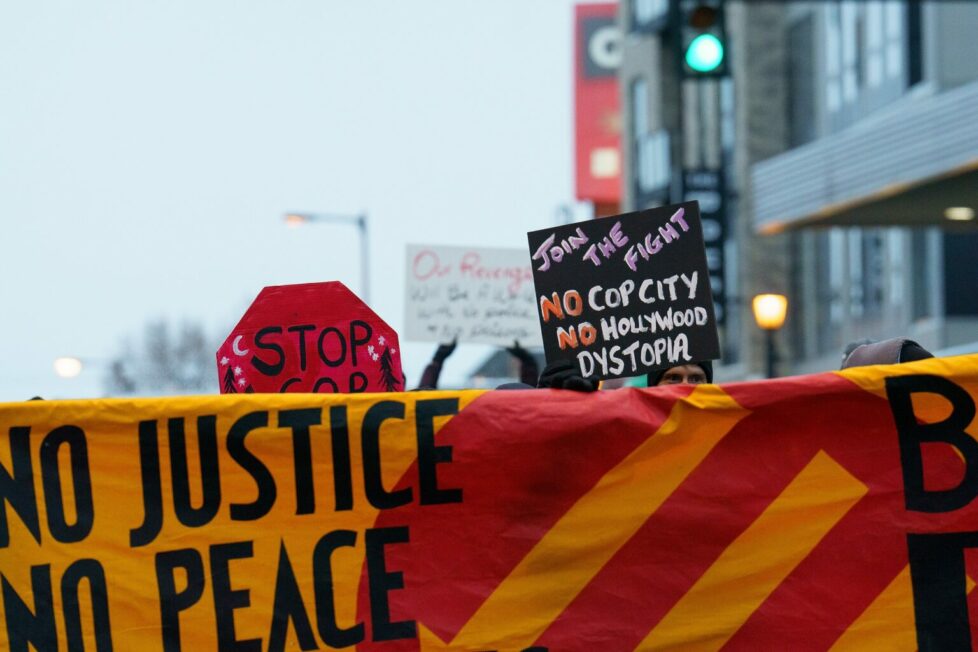Protesters in Georgia’s ‘Cop City’ hit with racketeering charges


By: Stacy M. Brown / NNPA
Georgia prosecutors have charged 61 people with racketeering after a lengthy state investigation into protests against building a police and firefighter training facility in the Atlanta area called “Cop City.” The sweeping indictment unleashed a flurry of legal and political debates across the state.
Republican Attorney General Chris Carr called the defendants “militant anarchists” who reportedly supported a violent movement with roots in the widespread racial justice protests of 2020. Meanwhile, Georgia’s anti-racketeering law, known as RICO, has recently gained notoriety after being employed against four-time indicted and twice-impeached former President Donald Trump and 18 others by the Fulton County prosecutor.
Most of those indicted in the “Cop City” controversy were already facing prosecution for their purported involvement in the movement. RICO charges could add substantial penalties on top of existing counts. Among the defendants are more than three dozen individuals already facing domestic terrorism charges in connection with violent protests. Additionally, three leaders of a bail fund previously accused of money laundering and three activists charged with felony intimidation are part of the indictment.
“The 61 defendants together have conspired to prevent the construction of the Atlanta Public Safety Training Center by conducting, coordinating, and organizing acts of violence, intimidation, and property destruction,” Carr said during a news conference. The defendants face charges that include possessing fire accelerants, hurling Molotov cocktails at police officers, and being reimbursed for supplies like glue and food for activists who camped near the construction site for months.
Activists leading a referendum against the project decried the indictments as “anti-democratic.” “Chris Carr may try to use his prosecutors and power to build his gubernatorial campaign and silence free speech, but his threats will not silence our commitment to standing up for our future, our community, and our city,” The Cop City Vote coalition stated.
GOP Gov. Brian Kemp praised the indictment, emphasizing his commitment to safeguarding Georgians from “out-of-state radicals” threatening citizens and law enforcement.
Protests against the proposed training center escalated in January after the fatal shooting of 26-year-old protester Manuel Esteban Paez Terán, known as Tortuguita.
The Georgia Bureau of Investigation claimed that state troopers had fired in self-defense after Paez Terán shot at them while clearing protesters from a wooded area near the facility’s site. However, the absence of body cameras on the troopers involved and lingering questions have fueled skepticism.
Supporters of the training center, including Atlanta Mayor Andre Dickens, argue that the facility, costing $90 million and spanning 85 acres, is essential to addressing the inadequacies in current police training facilities and recruiting and retaining police officers.
Prosecutors traced the roots of the “Stop Cop City” movement back to George Floyd’s murder in Minneapolis. Despite the timing of the protests predating the announcement of plans for the training center, prosecutors asserted that “violent anti-police sentiment” has remained a driving force in Atlanta.
Since 2021, multiple instances of violence and vandalism have been attributed to the movement. Two notable incidents include torching a police car during a January protest and an episode in March when over 150 masked protesters clashed with police at the construction site, setting fire to construction equipment before dispersing into a nearby music festival.
Among those charged in March was Thomas Jurgens, a Southern Poverty Law Center staff attorney. Despite wearing a distinctive green hat used by legal observers, Jurgens’ arrest raised concerns among human rights organizations, which labeled it a “heavy-handed law enforcement intervention against protesters.”
In addition to the 61 racketeering indictments, five defendants also face domestic terrorism and first-degree arson charges. Three leaders of the Atlanta Solidarity Fund, which offered bail support and legal assistance to arrested protesters, were indicted on 15 counts of money laundering.
The “Stop Cop City” movement has reportedly intermittently witnessed episodes of vandalism and violence. Opponents have expressed a fear that the construction of the training center will contribute to the militarization of the police and exacerbate environmental damage in an economically disadvantaged, predominantly Black area.
Political tensions, public opposition, and heated debates have marked the controversy surrounding Cop City. That includes the Atlanta City Council’s decision to allocate $30 million to $50 million towards the project, despite significant public dissent. Over 200 individuals testified during the vote, with the majority opposing the allocation.
